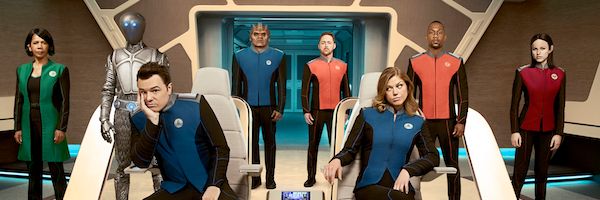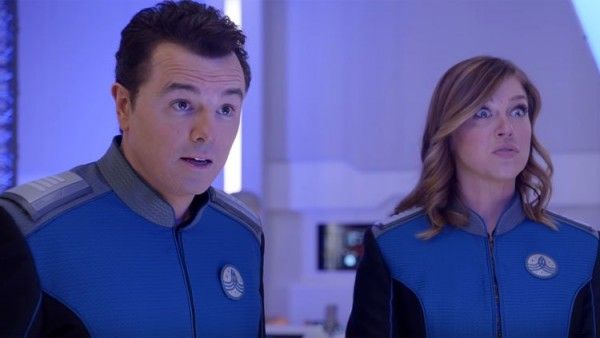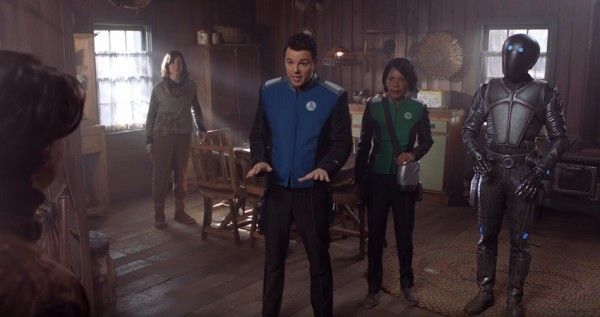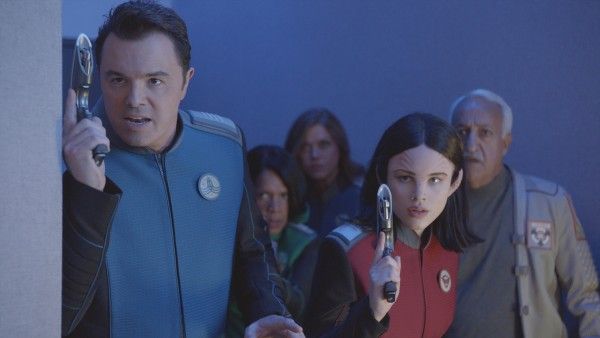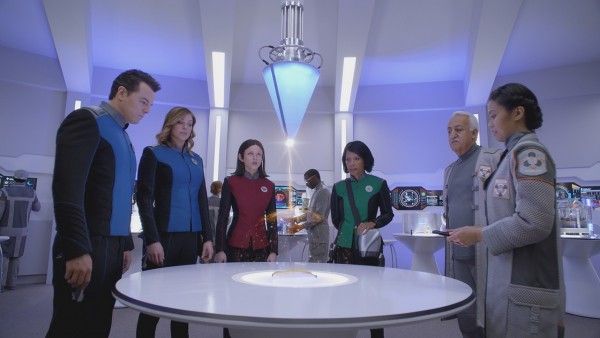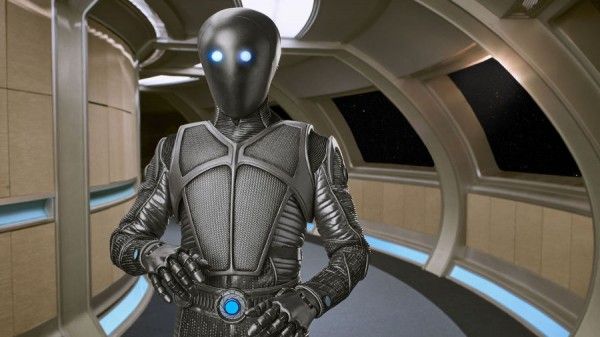At this year's TCA, Seth MacFarlane had a problem. Following screenings of the first few episodes of The Orville, his new science-fiction comedy for Fox, it was clear that the show hadn't exactly bowled the audience over. Even worse, it seemed that they had quickly hooked onto a problematic truth: that MacFarlane and Fox had made a Star Trek show in everything but name, and set it to debut only a few weeks before CBS's Star Trek: Discovery. MacFarlane denied the similarities to the iconic series with gusto, but the cat was irrefutably out of the bag.
Let's forget the fact that MacFarlane is simply lying when he says the show is not like Star Trek for the moment. Good will has not exactly been on Star Trek: Discovery's side in the aftermath of CBS ostensibly firing Bryan Fuller, the creative force behind American Gods and Hannibal, for actually trying to make something more sensory, political, and thematically audacious than past Star Trek series. In theory, MacFarlane, an outspoken obsessive and devotee of Star Trek, could have made a great show in the vein of Gene Rodenberry's series, tending to elements of story and character that he always felt one of the half-dozen shows in the universe that spawned from Rodenberry's original show had missed or weren't able to confront in their time. Despite what cynics, Star Trek die-hards, and MacFarlane detractors might say in the lower recesses of social media and comment sections, The Orville was not doomed from the outset under any circumstances.
To an extent, MacFarlane has brought new elements to bear. Starring as the divorced Captain Ed Mercer of the titular spaceship, MacFarlane attempts to temper the ironclad sense of duty and discovery in the original series with excremental humor. In the opening scene, Mercer catches his wife, Kelly (Adrianne Palicki), having sex with an alien who ejaculates forcefully as a punchline. Later on, one of Mercer's most valuable crew members, Bortus (Peter Macon), a gruff Worf-like creature, spends the entire episode laying an egg and then nesting atop it. It's humor that speaks primarily to adolescent trolls at best, and underlines the stark limitations of MacFarlane's writing. Even a general sense of amusement is hard to grasp onto in The Orville.
The series is set over a year after Mercer caught Kelly, now his ex and second-in-command on the Orville, and much of the series centers on their ill-mended relationship. Of the three episodes that were screened for critics, two of them are anchored on how they relate to one another and how their relationship functions in the wake of her betrayal and his flippant attitude toward her needs. As anyone who watched Friday Night Lights can attest, Palicki is a gifted performer and to his credit, MacFarlane is a jolt of comedic energy in Steven Soderbergh's excellent Logan Lucky and did sensational voice work in Hellboy II: The Golden Army. Burdened with the show's formulaic, embarrassingly "topical" writing and thoroughly unimaginative direction, however, neither of them are called upon to really test themselves or confront the nuances of shifting from a personal relationship to a professional one. The show seems far more comfortable suggesting that such a shift is inherently impossible, and that the best and only option is to merge the two.
This speaks to a larger issue of tone in The Orville. Where The Next Generation and The Original Series were primarily science-fiction shows sprinkled with comedic interludes, The Orville constantly feels uncertain if it wants to be taken seriously or not. The third episode of the series includes an earnest yet weightless gender-identity storyline that amounts to little more than virtue signaling, and one could even perceive Bortus' egg-hatching storyline as an attempt to discuss paid maternity leave in a completely innocuous way. If these matters had been the sole focus of the episodes, there may have been some sense of nuance or personal experience threaded into the narrative, but most of these episodes are filled with clunky jokes, mind-numbing melodrama, or irrelevant invented jargon. The amount of thought put into the depictions of major social issues is no more or less than that of retweeting an article from The Atlantic that you've never read but has a great headline, all in the hopes of appearing woke and relevant. The stench of market-testing emanates from this show like two-month-old Thai food left in the back of your fridge.
Even if one were to ignore all of this, the technical aspects of The Orville are nothing to herald, and this is where its unmistakable similarities to Star Trek become impossible not to talk about. The style and cut of the wardrobe is near-identical to that of The Next Generation, and its delineated by colors to show ranking. If one were to take Mercer and Kelly as the show's Picard and Riker, the rest of the Orville crew similarly fits snuggly into the Enterprise roles: an all-knowing robot, a wise and humane female doctor, an alien tough with a oddly shaped forehead, and a Tasha Yar-like badass. The make-up and design of the species that they encounter look slightly better, but that's more to do with industry advances than anything else, and the interiors of the ship are also strikingly familiar. There's even a race of evil aliens introduced in the first episode that might as well be a photocopy of the Romulans.
The truth is that much of these similarities would not have mattered if The Orville could have settled on a tone or made for some compelling interpersonal drama in any of these episodes. It would be simply impossible to name all the shows and movies that are derivatives of Star Trek and plenty of them are entertaining -- Firefly and Babylon 5, just for starters. Those series took steps to distance themselves from the basic format of Star Trek and ended up with strange, alluring plots and a diverse array of complicated characters, aliens and humanoids alike. By playing it safe and showing a truly breathtaking lack of creativity, The Orville can't even claim to be better than the myriad of Star Trek fan films that can currently be found on YouTube. If nothing else, at least those have a genuine sense of passion and adoration behind them, whereas MacFarlane's xerox offers only empty veneer.
Rating: ★ – Skip it
The Orville premieres Sunday, September 10th on Fox.

